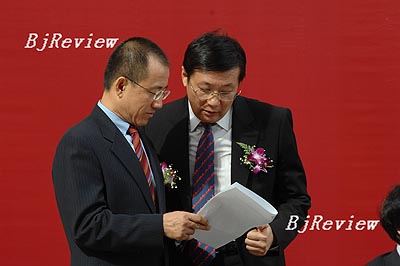|

After the China Investment Corp. (CIC) was officially launched and the decision-making team finally posed for the media in Beijing on September 29, how the state-owned investment corporation will manage the $200 billion in capital is the biggest question mark.
The CIC, solely state-owned, got its registered capital of $200 billion from China's huge foreign exchange (forex) reserves-the Ministry of Finance issued 1.55 trillion yuan ($206.7 billion) of special treasury bonds to buy $200 billion in forex reserves and invested the money into the corporation.
With one of the world's richest investment funds at its disposal, challenges lie ahead for the CIC about whether it can earn higher returns than investing in safe but low-yielding U.S. Treasury bonds and ease overseas worries concerning its investment directions.
Dream team
It was announced that Lou Jiwei, former Deputy Secretary General of the State Council, was appointed the company's board chairman, Gao Xiqing, Vice Chairman of the National Council for Social Security Fund, is the general manager and Hu Huaibang, Commissioner of Disciplinary Inspection of the China Banking Regulatory Commission, took the post as chief supervisor.
The board of directors consists of 11 members including three executive directors-Lou Jiwei, Gao Xiqing and Vice Minister of Finance Zhang Hongli; five non-executive directors from the People's Bank of China, the National Development and Reform Commission (NDRC), the Ministry of Finance, the Ministry of Commerce and the State Administration of Foreign Exchange; two independent directors-Liu Zhongli, former Minister of Finance, and Wang Chunzheng, Vice Minister of the NDRC; and one director who will be elected from the company's employees.
According to Lou, the company will focus its overseas investments mainly on a portfolio of financial products to maximize the proceeds via long-term investments within a range of acceptable risks. It will also invest in domestic financial institutions so as to retain and increase the value of state-owned assets.
The CIC will operate in a completely commercial way despite its government backing. "We will maintain transparency of company operations on the premise of safeguarding our commercial interests," said Lou. "We will deal with the forex investment business independently by persisting in the principle of separating government functions from company management."
The state-owned Central Huijin Investment Corp., founded in 2003, was merged into the new company as a wholly-owned subsidiary company. Central Huijin will continue to inject capital into domestic financial institutions to support their reforms, such as shareholding reforms of China's state-owned banks, while the CIC will focus on overseas investment projects.
There is no shareholders' meeting as the CIC is solely owned by the state. As a result, a management committee of seven was formed to be responsible for the daily operation and decision making on overseas investments. Besides Lou, Gao, Hu and Zhang, the committee includes Yang Qingwei, head of NDRC's fixed assets investment department, Xie Ping, General Manager of the Central Huijin Investment Corp., and Wang Jianxi, Vice Board Chairman of the Central Huijin.
The management committee of seven for the CIC seems to be a stable decision-making organization, guaranteeing the reasonability and feasibility of decisions as well as the security of the fund.
Yet, some are worrying that the multiple backgrounds of the committee members could be the biggest challenge the CIC faces. "The committee involves too many ministries which may affect the efficiency of the investment decision making process," said He Fan, a researcher with the Institute of World Economics and Politics of the Chinese Academy of Social Sciences (CASS).
Where to invest?
In May, the new company, still in preparation, made its first investment in non-voting shares, valued at $3 billion, in the U.S. private equity firm The Blackstone Group, which got a lot of publicity.
According to the design of the State Council, CIC's major task is to inject excessive forex reserves into combined investments in overseas companies and financial markets in order to increase proceeds of forex assets. Its operation covers investment in overseas financial markets and domestic financial institutions, as well as overseas equity investments. The CIC will come up with more strategies like the Blackstone investment.
China has spent its huge forex reserves buying U.S. Treasury bonds for quite a long time and began to invest its reserves in other foreign currencies such as euros and British pounds, agency bonds, and high-quality and high-yield corporate bonds.
The launch of the CIC is conducive to the professional management of forex reserves. It was disclosed that the CIC would continue to invest in private equity funds and hedge funds and to provide financial support to state-owned enterprises in overseas investment and financing.
| 